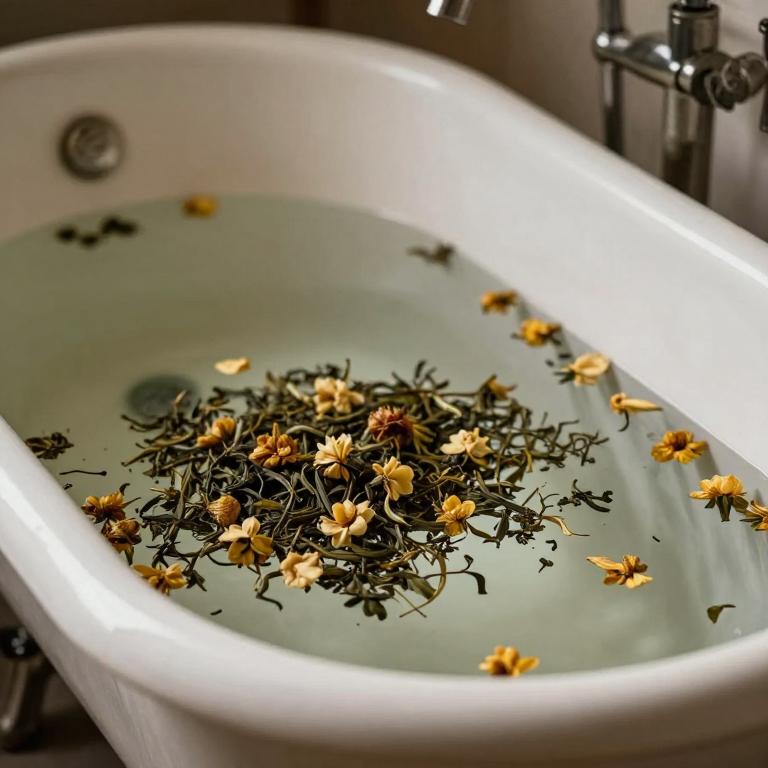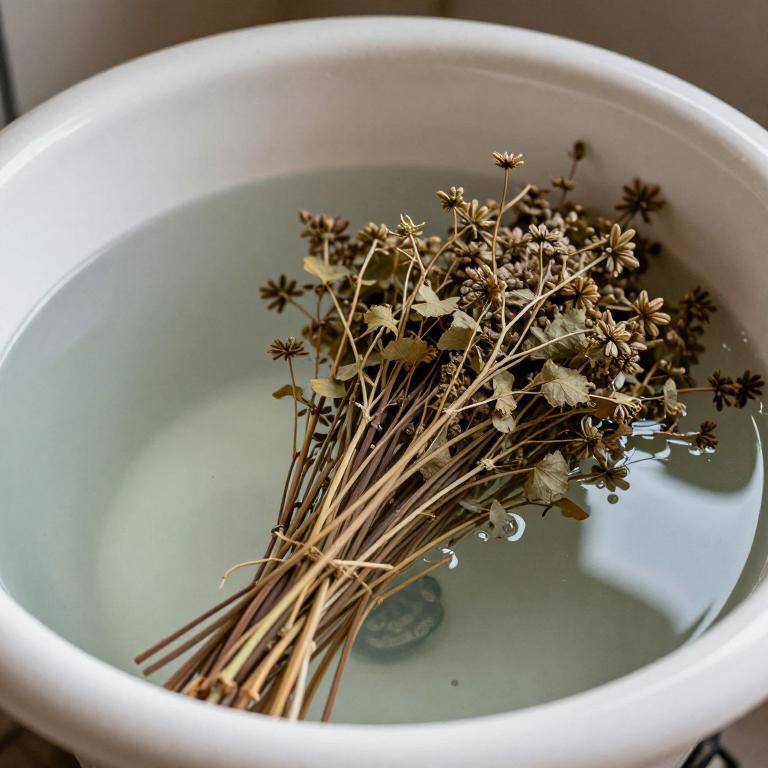10 Best Herbal Baths For Colds

Herbal baths can be a soothing and effective remedy for alleviating symptoms of a cold.
Certain herbs such as eucalyptus, lavender, and chamomile are commonly used in bath infusions to help open airways, reduce congestion, and promote relaxation. The warm water combined with aromatic herbs can help ease respiratory discomfort and provide a sense of comfort during illness. These baths also encourage sweating, which may help the body eliminate toxins and support the immune system.
While herbal baths are not a substitute for medical treatment, they can complement other cold remedies and offer a natural way to feel better.
Table of Contents
- 1. Salvia (Salvia officinalis)
- 2. Peppermint (Mentha piperita)
- 3. Rosemary (Rosmarinus officinalis)
- 4. Camellia (Camellia sinensis)
- 5. Thyme (Thymus vulgaris)
- 6. Eucalyptus (Eucalyptus globulus)
- 7. Ginger (Zingiber officinale)
- 8. Stinging nettle (Urtica dioica)
- 9. Parsley (Petroselinum crispum)
- 10. Yarrow (Achillea millefolium)
1. Salvia (Salvia officinalis)

Salvia officinalis, commonly known as sage, has been traditionally used in herbal baths to help alleviate symptoms of colds.
When infused into bath water, sage's aromatic properties can help clear nasal congestion and soothe respiratory discomfort. The anti-inflammatory and antimicrobial qualities of sage may support the body's natural healing process during a cold. A warm sage bath can also promote relaxation and reduce the stress associated with illness.
Incorporating salvia officinalis into a bath routine can be a gentle, natural complement to conventional cold remedies.
2. Peppermint (Mentha piperita)

Mentha piperita, commonly known as peppermint, is often used in herbal baths to help alleviate symptoms of colds.
The invigorating aroma of peppermint can help clear nasal congestion and ease breathing, providing relief from stuffiness. Adding a few drops of peppermint essential oil to warm bath water can create a soothing and therapeutic experience. The steam from the bath helps open up the airways, while the menthol in peppermint has a cooling effect that can reduce inflammation.
This natural remedy is a gentle and effective way to support the body’s healing process during a cold.
3. Rosemary (Rosmarinus officinalis)

Rosmarinus officinalis, commonly known as rosemary, has been traditionally used in herbal baths to help alleviate symptoms of colds by promoting circulation and providing a soothing effect on the body.
When infused into bath water, rosemary's aromatic compounds can help clear nasal passages and ease congestion, offering natural relief from respiratory discomfort. The warming properties of the bath can also help soothe sore muscles and reduce overall body aches often associated with colds. Additionally, the calming scent of rosemary may have a positive effect on mood and stress levels, supporting overall wellness during illness.
While herbal baths are not a cure for colds, they can be a comforting and complementary remedy to support the body's natural healing process.
4. Camellia (Camellia sinensis)

Camellia sinensis, commonly known as the tea plant, is the source of various herbal infusions that have been traditionally used for their therapeutic properties.
While primarily consumed as tea, certain forms of Camellia sinensis can also be incorporated into herbal baths to provide soothing relief for cold symptoms. These baths may help alleviate congestion, reduce inflammation, and promote relaxation by leveraging the plant's antioxidant and anti-inflammatory compounds. To prepare a Camellia sinensis bath, dried leaves or infused herbal extracts can be added to warm water, allowing the beneficial properties to be absorbed through the skin.
Although not a substitute for medical treatment, such baths can offer a natural, calming complement to cold care routines.
5. Thyme (Thymus vulgaris)

Thymus vulgaris, commonly known as thyme, has been traditionally used in herbal baths to help alleviate symptoms of colds due to its antimicrobial and warming properties.
When added to warm water, thyme essential oil or dried thyme leaves can create a soothing bath that helps open up the airways and relieve congestion. The aromatic compounds in thyme, such as thymol, may promote relaxation and ease respiratory discomfort associated with colds. This herbal bath can also help reduce inflammation and boost the body's immune response, supporting natural healing processes.
While it is a complementary remedy, it should not replace medical treatment for severe or persistent cold symptoms.
6. Eucalyptus (Eucalyptus globulus)

Eucalyptus globulus, commonly known as Australian eucalyptus, is often used in herbal baths to help alleviate symptoms of colds due to its strong antiseptic and decongestant properties.
When added to warm water, the essential oils from eucalyptus globulus release aromatic vapors that can help open up the nasal passages and ease breathing. This type of bath can also promote relaxation and reduce the overall discomfort associated with cold symptoms. The soothing heat of the water combined with the therapeutic effects of the eucalyptus oil can provide relief from congestion, sore throat, and fatigue.
However, it is important to use the essential oil sparingly and dilute it properly to avoid skin irritation.
7. Ginger (Zingiber officinale)

Zingiber officinale, commonly known as ginger, has been traditionally used in herbal baths to alleviate symptoms of colds due to its warming and anti-inflammatory properties.
When infused into bath water, ginger can help soothe sore muscles, ease congestion, and promote relaxation, providing natural relief from cold-related discomfort. The aromatic compounds in ginger also stimulate circulation and may help reduce fever, making it a comforting addition to a cold remedy regimen. Herbal baths with ginger are often recommended as a complementary therapy to support the body's natural healing processes.
However, individuals with sensitive skin or certain medical conditions should consult a healthcare provider before using ginger baths.
8. Stinging nettle (Urtica dioica)

Urtica dioica, commonly known as stinging nettle, has been traditionally used in herbal baths to alleviate symptoms of colds due to its anti-inflammatory and soothing properties.
When infused into bathwater, stinging nettle can help reduce nasal congestion and soothe sore throats by promoting circulation and easing respiratory discomfort. The warmth of the bath enhances the absorption of the plant’s beneficial compounds, offering a holistic approach to cold relief. This natural remedy is particularly effective for those seeking non-pharmacological ways to support their immune system during a cold.
However, it is important to ensure that the nettle is properly prepared and that the bath temperature is comfortable to avoid skin irritation.
9. Parsley (Petroselinum crispum)

Petroselinum crispum, commonly known as parsley, has been traditionally used in herbal baths to help alleviate symptoms of colds.
The essential oils found in parsley, such as apiol and limonene, possess antimicrobial and anti-inflammatory properties that may help reduce congestion and soothe respiratory discomfort. To prepare a parsley bath, fresh or dried parsley can be steeped in hot water and then added to a tub of warm water, allowing the steam to release its aromatic compounds. This type of bath is believed to promote relaxation and ease breathing, offering a natural remedy for those suffering from cold-related symptoms.
While it is not a cure for colds, parsley baths can complement other remedies and support the body's natural healing process.
10. Yarrow (Achillea millefolium)

Achillea millefolium, commonly known as yarrow, has been traditionally used in herbal baths to help alleviate symptoms of colds due to its anti-inflammatory and antiseptic properties.
When infused into bath water, yarrow can help soothe sore throats, reduce congestion, and promote a sense of overall well-being. The warmth of the bath enhances the absorption of the herb's active compounds, providing a calming and therapeutic effect. This natural remedy is often recommended for its ability to ease respiratory discomfort and support the body's natural healing processes.
However, it is important to consult with a healthcare provider before using yarrow baths, especially for individuals with known allergies or existing health conditions.